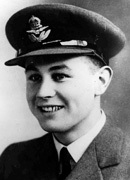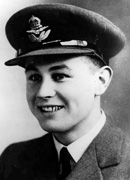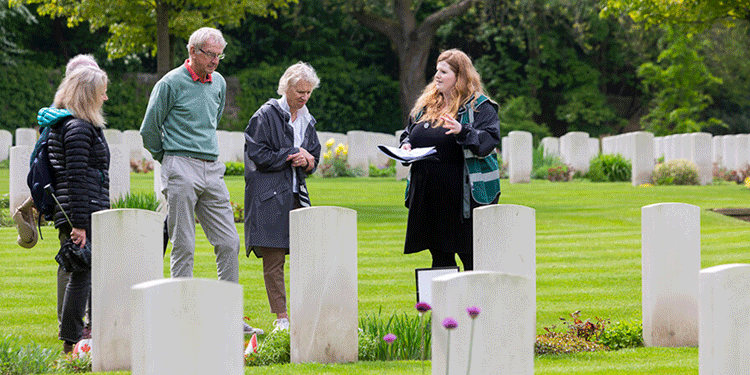
Cyril Joe Barton was born in Elveden, Suffolk on 5th June 1921, the son of Frederick and Ethel, and received his early schooling at the Beverley Boys' School, in New Malden. At 16 years of age, he was apprenticed as an engineer at the Parnall Aircraft Factory works in Tolworth, and was a part-time student of engineering at Kingston Technical College, in Kingston-upon-Thames.
Aged 19, Cyril left his reserved occupation apprenticeship at the factory and volunteered for the Royal Air Force Volunteer Reserve on 16th April 1941. After pilot training via the Arnold Scheme at Maxwell Field, Montgomery, Alabama, and 'Darr Aero Tech' at Albany, Georgia, he qualified as a Sergeant Pilot on 10th November 1942. He then returned to England and completed his training with No. 1663 Heavy Conversion Unit at Rufforth in Yorkshire.
On 5th September 1943, Cyril joined an aircrew serving in 78 Sqn Bomber Command, receiving a commission as a Pilot Officer three weeks later and had completed nine sorties when on 15th January 1944, he was posted to 578 Sqn, based at RAF Burn in North Yorkshire.
On the night of 30th March 1944, while flying in an attack on Nuremberg, during the Battle of Berlin air offensive, and 70 miles from the target, the aircraft was badly damaged in attacks by two night fighters, resulting in two of its fuel tanks being punctured; both its radio and rear turret gun port being disabled; and the starboard inner engine being critically damaged. The internal intercom lines were also cut and due to orders being mis-interpreted, three members of the crew parachuted from the aircraft.
Cyril managed to crash-land the bomber near the village of Ryhope, Tyne and Wear, steering away in the final descent from houses and coal pit-head workings. He was pulled from the wrecked aircraft alive but died of injuries before he reached hospital. The three remaining onboard members of the crew survived the landing.
Cyril was buried with full military honours in Kingston-upon-Thames Cemetery. For his actions in the attack, in June 1944, Cyril was posthumously awarded the Victoria Cross.
VC Citation: The KING has 'been graciously pleased to confer the VICTORIA CROSS on the undermentioned officer in recognition of most conspicuous bravery — Pilot Officer Cyril Joe BARTON (168669), RAFVR, 578 Squadron (deceased).
"On the night of 30th March 1944, Pilot Officer Barton was captain and pilot of a Halifax aircraft detailed to attack Nuremberg when some 70 miles short of the target, the aircraft was attacked by a Junkers 88. The first burst of fire from the enemy made the intercommunication system useless. One engine was damaged when a Messerschmitt 210 joined the fight. The bomber's machine guns were out of action and the gunners were unable to return the fire. Fighters continued to attack the aircraft as it approached the target area and, in the confusion caused by the failure of the communications system at the height of the battle, a signal was misinterpreted and the navigator, air bomber and wireless operator left the aircraft by parachute.
Pilot Officer Barton faced a situation of dire peril. His aircraft was damaged, his navigational team had gone, and he could not communicate with the remainder of the crew. If he continued his mission, he would be at the mercy of hostile fighters when silhouetted against the fires in the target area and if he survived, he would have to make a four-hour journey home on three engines across heavily defended territory. Determined to press home his attack at all costs, he flew on and, reaching the target, released the bombs himself.
As Pilot Officer Barton turned for home the propeller of the damaged engine, which was vibrating badly, flew off It was also discovered that two of the petrol tanks had suffered damage and were leaking. Pilot Officer Barton held to his course and, without navigational aids and in spite of strong headwinds, successfully avoided the most dangerous defence areas on his route.
Eventually he crossed the English coast only 90 miles north of his base. By this time, the petrol supply was nearly exhausted. Before a suitable landing place could be found, the port engines stopped. The aircraft was now too low to be abandoned successfully.
Pilot Officer Barton therefore ordered the three remaining members of his crew to take up their crash stations. Then, with only one engine working, he made a gallant attempt to land clear of the houses over which he was flying. The aircraft finally crashed, and Pilot Officer Barton lost his life, but his three comrades survived."
Post-war, Cyril was posthumously awarded the 1939–1945 Star; the Air Crew Europe Star; the Defence Medal, and the War Medal 1939–1945.
In a last letter to his younger brother shortly before his death, he wrote: "I am quite prepared to die, death hold no terrors for me. I have done nothing to merit glory."
POST-WAR COMMEMORATIONS
Over the years, there have been a large number of memorials created in Cyril’s honour:
"Barton Green" in New Malden, Surrey, where he had attended school, was named in his honour in the early 1950s.
In 2000 on the 56th anniversary of his death, "Barton Road" at the Yorkshire Air Museum in Elvington, North Yorkshire, was named in his honour.
A housing estate in Ryhope, "Barton Park" was also named after him, and a nearby street was named "Halifax Place" after the bomber-type that Cyril was flying when he died.
Coombe Boys' School in New Malden (formerly named Beverley Boys' School when Cyril was a pupil) named a new building after him in 2009.
Kingston College, where Cyril was a student when the war broke out, offers an annual prize for the pupil of the year, which is named after him.
A portrait painting of Cyril hangs in his memory in the Wheatsheaf Inn at Burn, North Yorkshire, where his squadron was based at the time of his last sortie.



